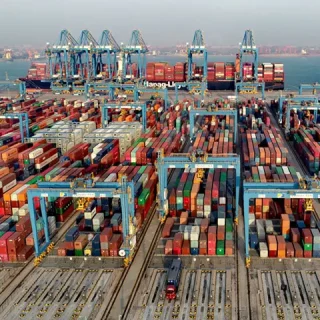The global investment migration space has become a US$100 billion industry (Source: IMI). Because borders are simultaneously more open and more complex than ever before, wealth is flowing internationally.
Three markets stand out as growing markets for investment migration firms: China, the United States, and South Africa. China maintains its position as the world’s largest source of investment migration clients, with over 15,400 millionaire departures in 2024 alone. Meanwhile, American expatriation has surged by hundreds of percentage points, and South Africa’s investment migration applications have jumped significantly as citizens seek alternatives abroad.
For investment migration firms, serving these markets is not only an opportunity but a necessity. Each brings unique challenges and rewards, from China’s vast high-net-worth individual (HNWI) population to America’s growing interest in dual citizenship programs.
Let’s explore why these three markets deserve your attention, and more importantly, your firm’s presence.

3. China: The High-Volume Powerhouse
Market Dynamics
When President Xi Jinping announced the Common Prosperity campaign in 2021, China’s wealth management industry changed forever. Under this policy, wealthy Chinese citizens face increased scrutiny of their assets, stricter tax enforcement, and growing pressure to demonstrate social responsibility.
These factors – combined with a trade war with the US, anti-China sentiment around the world, and recent crackdowns on tech billionaires and real estate developers – have created a perfect storm driving outbound investment.
This single policy shift has sparked a significant wave of Chinese high-net-worth individuals searching for both investment and immigration opportunities abroad.
Despite economic headwinds and strict capital controls, China’s millionaire population reached 6.2 million in 2023. But more importantly for your industry and interests, an estimated 15,400 of those millionaires left the country. That means more Chinese are pursuing investment migration programs abroad than any other nationality.
But where are these wealthy Chinese investors heading?
While the United States and Canada once dominated destination preferences, attention has turned to Singapore, which has welcomed thousands of Chinese HNWIs and billions of dollars in investments in investments, and other countries around the world. Australia and New Zealand follow closely, with their stable political environments, close proximity, and world-class education systems drawing interest from Chinese families.
Additionally, wealthy Chinese individuals are increasingly investing in Caribbean citizenship by investment programs, European golden visa programs (i.e. Greece, Italy, Malta, Portugal), and Dubai residency. In fact, Chinese nationals have historically comprised up to 40% of European golden visa programs’ applicants and investors.
The Common Prosperity campaign continues to reshape China’s investment migration market. The most successful investment migration firms of the last few decades have understood this. They have capitalized on the opportunity to assist Chinese HNWIs who are looking for these comprehensive wealth diversification and preservation strategies and immigration opportunities abroad.
Moreover, several global trends have led more Chinese nationals to seek a better, more diversified life abroad.
Because of these factors, most telling is the rise in multi-generational planning among Chinese clients. A huge portion of Chinese residency and citizenship program applicants are interested in protecting their children’s education opportunities and future mobility. For wealthy Chinese families, investment migration is a lifelong strategy rather than a quick fix. (Read also: Shifts in Foreign Investment: China’s Economic Reorientation Amid Trade Tensions)

Business Development Opportunities
Contrary to popular belief, having a physical presence in China is not necessarily a precursor to success in China’s investment migration market. That strategy may function well in other markets. But in China, success is also about building the right relationships.
Family offices have emerged as the golden path to China’s ultra-wealthy. Managing assets worth hundreds of billions of dollars, over 800 family offices are registered in Shanghai alone. And, these family offices do not work alone.
In China, family offices assume part of a complex financial strategy network that includes wealth management firms, tax advisors, and immigration specialists. In 2023, Chinese family offices reported that a growing number of their HNWI clients requested information about investment migration options through their existing wealth management channels. This dynamic presents a clear opportunity for investment migration firms willing to integrate into already-established Chinese networks.
However, Chinese financial industries play by a different set of rules, and compliance is everything. China’s State Administration of Foreign Exchange (SAFE) regulations strictly control how money moves across borders. Investment migration firms must navigate these rules carefully. The most successful firms partner with local legal, financial, and tax experts who understand their international mobility solutions and Chinese regulatory requirements.
Culture considerations will make or break an investment migration firm’s success in China: The concept of “guanxi” (relationships) remains crucial. Chinese HNWIs typically make decisions through trusted intermediaries rather than direct contact, particularly with foreign firms. Successful investment migration cases involving Chinese HNWIs can have at least three meetings with local partners before the client moves forward.
Based on our and our clients’ experience in China, here’s what works:
- Building long-term relationships with private client advisors (e.g. wealth managers, family offices, immigration agents, etc.) rather than chasing quick wins
- Having Mandarin-speaking staff or partners like Outbound Investment who understand both Western and Chinese business cultures
- Working through already-established wealth management channels rather than direct marketing
The key is patience. While Western firms might close deals in weeks, Chinese partnerships often take months to develop. But the rewards – access to the world’s largest investment migration market – make the wait worthwhile.

2. United States: The Emerging Exodus Market
American Expatriation Trends
Something unprecedented is happening in America. Since 2014, the number of Americans living in the European Union has skyrocketed by 72%, with Portugal alone seeing a staggering 500% increase in immigration of US citizens. Today, roughly nine million Americans live abroad. (Read also: American Expat: Why Millions of Americans Are Moving Abroad)
The reasons behind this exodus are as diverse as America itself.
First, Americans have the unique burden of citizenship-based taxation: Americans remain the only major nationality required to file taxes on worldwide income, regardless of where they live. In high-tax states like California, top earners effectively hand over half their income to various levels of government. Opening the door to potential wealth taxes, the recent Moore v. US Supreme Court case and GILTI Tax have only heightened concerns.
Moreover, healthcare costs push many toward the exit. While Americans can spend on average more than US$12,000 on annual health insurance premiums and out-of-pocket expenses in the United States, many European countries offer high-quality universal healthcare at a fraction of the cost.
Last, millions of Americans are increasingly frustrated with the country’s political division. Social tension has led to higher violent crimes and gun-related deaths, as well as drug and homelessness crises that have ravaged major city centers.
So who is leaving the United States? Predominantly these three groups:
- Tech professionals aged 30–45 seeking better work-life balance and global investment opportunities
- Pre-retirees aged 50–65 looking to stretch their retirement savings in more affordable locations
- Entrepreneurs and HNW investors seeking a second residency and citizenship abroad
Most striking is the wealth level of these new American expats. Unlike previous waves of retirees seeking budget-friendly havens, American emigrants bring significant assets, making them prime clients for investment migration firms. In 2025, because of the surge in second residency and citizenship planning, Americans often make up half of a given residency or citizenship’s program applicant pool.

Strategic Market Entry
Breaking into the American investment migration market requires a fundamentally different approach than any other jurisdiction in the world. Why? Because Americans’ unique pain points and citizenship-based taxation system create layers of complexity that demand specialized expertise.
Tax attorneys are your first crucial allies. Because of unique tax laws (e.g. citizenship-based taxation, FATCA/FBAR compliance, and exit taxes) in the United States, successful investment migration cases often involve consultation with a tax attorney before the client commits to a program. Without their sign-off and the expertise of other financial advisors on whom American clients lean, most high-net-worth Americans won’t make a determinant move.
CPA networks, law firms, wealth advisors, and other private client advisors are your gateway to American HNWIs.
America’s tens of thousands of CPA firms serve as trusted financial advisors to wealthy individuals, and they are often the first to hear when clients consider international investment options. The first investment migration firms to build presence in the United States have done so by building relationships with CPA and financial advisor networks in high-tax states like California and New York, where interest in overseas options is strongest.
Additionally, wealth advisors with expertise in both US and international financial systems can help structure clients’ assets for optimal efficiency and compliance.
Here’s what a winning US investment migration marketing strategy looks like:
- Regular educational workshops for tax attorneys and CPAs about investment migration options
- Strong relationships with private client advisors like wealth managers, financial planners, luxury real estate agents, and family office managers
- Clear processes for coordinating with clients’ existing tax and legal advisors
But here’s the most critical factor: Transparency about US-specific challenges. American clients need to understand that investment migration doesn’t eliminate their US tax obligations unless they renounce citizenship. The most successful firms are those that help clients make informed decisions based on true understanding of their obligations. Firms that understand and cater to these requirements are the ones capturing this lucrative and rapidly growing market. (You might also be interested in: Why Americans Seeking Stability Should Consider Moving to Australia)

1. South Africa: The Untapped Growth Market
Market Analysis
In January 2024, when South Africa’s rand hit a historic low against the dollar, wealthy South Africans acted. Investment migration inquiries surged in 2024, South Africa’s economy grew less than 1% in 2024, currency depreciation saw the rand lose a significant portion of its value against the dollar. This economic squeeze has signaled a shift in how South African HNWIs view their future.
And, political stability concerns add fuel to the fire.
Power shortages, reaching up to 16 hours of daily blackouts in major cities, have shaken confidence in basic infrastructure. Crime rates in wealthy neighborhoods have spiked, pushing security to the top of many families’ concerns. Meanwhile, social division has skyrocketed.
But with over 40,000 millionaires and Africa’s most developed banking system, South Africa offers investment migration firms a wealthy, financially literate client base who are by-and-large already familiar with international investment.
The demand for mobility solutions has evolved beyond simple residency programs.
- South African HNWI applicants seek programs offering clear paths to citizenship.
- They prioritize destinations with strong educational opportunities for their children.
- They are interested in programs allowing business operations in multiple jurisdictions.
Most telling is the rise in “investment migration planning” among younger South African entrepreneurs. The average age of South African investment migration clients has dropped, indicating a shift from retirement planning to active wealth and investment management strategies. For investment migration firms, this market represents a perfect storm of opportunity: wealthy clients, urgent need, and sophisticated understanding of international finance. (You might also be interested in: Mauritius: The perfect hub to cater for Chinese investment into Africa)

Distribution Strategy
In a market where wealth preservation is paramount, who introduces your services matters more than what you’re offering.
Private banks serve as an effective gateway to South African HNWIs. With their relationship managers acting as trusted advisors to wealthy families, the country’s top five private banks manage over billions of dollars in assets. A high percentage of successful investment migration cases in South Africa originate through private banking referrals.
Financial advisor networks form the second pillar of distribution. South Africa has over 5,000 certified financial planners, with the top 10% serving the HNWI market. These advisors are gatekeepers who thoroughly vet international partners before making introductions to their wealthy investor and entrepreneurial clients.
Professional associations, particularly legal and accounting bodies, round out the ecosystem. The Law Society of South Africa and South African Institute of Chartered Accountants provide platforms for reaching qualified intermediaries in the industry. Successful investment migration firms partner with financial service provider-licensed entities and maintain compliant processes that please South African regulators.

Operational Framework
Building a presence in one, two, or all three of these emerging markets requires an integrated global operation that can serve sophisticated clients across time zones and regulatory environments. Start with the basics: Strong relationships with an operational partner like Outbound Investment who has expertise in the relevant market.
Data shows that investment migration firms with relationships in the market they’re pursuing are trusted more compared to those operating remotely with little knowledge of their audience. Each market requires:
- Local staff fluent in regional languages and business cultures
- Compliance officers familiar with local and global regulations
Working with a partner like Outbound Investment who has relationships in every corner of the planet makes investment migration professionals’ lives easier. By connecting them with interested investors, creating relationships with local intermediaries, and understanding the market at hand, a local partner can make a tremendous difference.
The most successful firms invest heavily in local staff training, particularly in communication and compliance. But this is not necessary if you partner with an external firm who knows the market inside-and-out.

Conclusion
The next 24 months represent a critical window of opportunity in global investment migration. With Chinese wealth seeking diversification, Americans increasingly looking abroad, and South African HNWIs prioritizing mobility, firms that establish strong presences in these markets now will dominate the industry for years to come. The first movers are already seeing results, but there’s still room for firms ready to make bold, strategic moves.
The question isn’t whether to enter these markets – it’s how quickly you can build a presence that meets their investment migration demands. If you’re interested in our services to reach more HNW clients in any of your markets,
contact us now.










